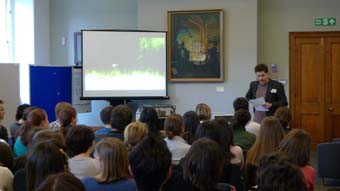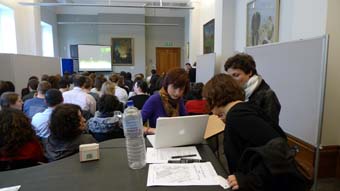The Young Embryologist Meeting, 2010. London.
Posted by Ben Steventon, on 23 June 2010
May 10th 2010 marked the second anniversary of a very young but promising scientific meeting, the Young Embryologist Meeting (YEM). This meeting was organised by a group of PhD students and young post-docs from London interested in developmental biology but open to everyone. Researchers at this level are just beginning to make decisions on what direction they would like their career to take. By bringing together young developmental biologists in an informal setting it was hoped to create research links that will outlast the time spent together in London. Also the idea was to create a network where exchange of ideas, support and even collaborations can occur. The outcome was a complete success with a packed seminar room full of students, post-docs and PI’s mostly from London but also from places like Barcelona, East Anglia and Cambridge. This massive attendance and the fact that already people are volunteering for next year’s meeting show how much an event like this was needed.
The meeting was held in the Wilkins room buried within the cloisters of University College London and its capacity was certainly stretched. It was opened by a keynote lecture by Peter Lawrence, who travelled down from Cambridge to talk to us about ‘Moments of discovery in a scientists life’. Everyone commented on how this talk was exactly what the conference needed. We were reminded about how it is the moment when one sees something new in nature that is the ultimate goal of research, and that these moments are a highly personal thing that once given to us can not be taken away again. It is this what drives us to keep experimenting and deal with all the frustrations that that can bring.
The meeting itself, an excellent series of short talks from young embryologists, was organised into four separate sessions. Each of session was named after the title of a classic embryological work that set the basis of the work presented in the corresponding session. This was to remind us of the importance in a continual re-appraisal of the core questions in embryology and to ask to what extent they have been answered, and how are we to address them in light of our recent knowledge and new techniques. The talks for each session were then selected with the aim of presenting a wide variety of different systems in which those core questions are being addressed. Through this and the subsequent discussion, it is hoped that ideas on the optimal experimental system in which to propose a particular research objective can be revealed. The talks covered areas ranging from de-novo centriole formation in mouse embryos, through to neurulation in zebrafish, mouse limb development, primary neurogenesis in Xenopus and the isolation of a novel organiser in the chick. Finally we had a series of talks focussing on neural crest development following by substantial amounts of wine and discussion.
The speakers and audience came form all places in London including the Department of Craniofacial Development and the MRC Developmental Neurobiology Department from KCL. In addition, we had talks from the institute of Women’s health and the Institute of Child Health, the NIMR at Mill Hill and the Department of Cell and Developmental Biology (CDB) at UCL. The CDB requires special thanks, as this was the sponsor of this event. The number of departments involved already, the people coming from outside London and the clear interest in organising new versions of the meeting will make the YEM a yearly and larger event. Thank you to everyone who helped to make this years meeting a success, we are sure everyone will agree on at least one thing; next year we will need a bigger room.
The 2010 YEM organising committee




 (3 votes)
(3 votes)
Thanks for the YEM update, Ben! I love that it’s also bringing together people from different places within London. I used to be in Toronto, which also has an abundance of different departments and institutes, and found that it was often hard to get in touch with people in those other groups, even if they were geographically close and working on similar things.
The YEN website has changed and is now at http://www.ucl.ac.uk/cdb/yen